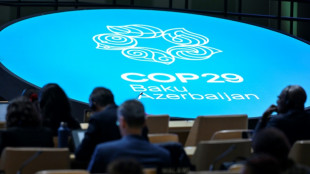
-
 Japanese, Koreans bottom of global love life survey
Japanese, Koreans bottom of global love life survey
-
Son blames 'mistakes' after South Korea held by Palestine in qualifier

-
 Japan ramps up tech ambitions with $65 bn for AI, chips
Japan ramps up tech ambitions with $65 bn for AI, chips
-
Lights, action, melodrama! Silent films get new reel at London haven

-
 Myanmar led world in landmine victims in 2023: monitor
Myanmar led world in landmine victims in 2023: monitor
-
ICC to sentence Timbuktu war criminal

-
 Ugandan opposition figure Besigye 'kidnapped', says wife
Ugandan opposition figure Besigye 'kidnapped', says wife
-
Australia's Jason Day eyes more major glory after resurgence

-
 Machu Picchu security boosted after visitors spread human ashes
Machu Picchu security boosted after visitors spread human ashes
-
Popovic hails Australia character in 'crazy' World Cup qualifier

-
 Taliban govt clearing 'un-Islamic' books from Afghanistan shelves
Taliban govt clearing 'un-Islamic' books from Afghanistan shelves
-
Argentina beat Peru as Uruguay hold Brazil

-
 Asian markets struggle as traders weigh geopolitical tensions
Asian markets struggle as traders weigh geopolitical tensions
-
Tatum stars as Celtics end Cavaliers unbeaten start

-
 Hurting India under pressure in blockbuster five-Test Australia series
Hurting India under pressure in blockbuster five-Test Australia series
-
'They killed her dream': Israel strike leaves woman footballer in coma

-
 Iraq holds its first census in nearly 40 years
Iraq holds its first census in nearly 40 years
-
Iraqis face tough homecoming a decade after IS rampage

-
 Russian net tightens around last civilians left in eastern Ukraine
Russian net tightens around last civilians left in eastern Ukraine
-
Olympic champion Tebogo aims to inspire next generation of African athletes

-
 Valencia on target as ten-man Ecuador upset Colombia
Valencia on target as ten-man Ecuador upset Colombia
-
'Rust' to premiere three years after on-set shooting

-
 Strike at French cognac maker Hennessy over measures in China spat
Strike at French cognac maker Hennessy over measures in China spat
-
Xi, Lula meet in Brasilia to 'enhance ties'

-
 SpaceX fails to repeat Starship booster catch, as Trump watches on
SpaceX fails to repeat Starship booster catch, as Trump watches on
-
'I have left a legacy': Nadal retires from tennis

-
 US recognizes Venezuela opposition's Gonzalez Urrutia as 'president-elect'
US recognizes Venezuela opposition's Gonzalez Urrutia as 'president-elect'
-
European powers, US seek to censure Iran at UN nuclear watchdog board

-
 UNAIDS chief says husband, Ugandan opposition figure Besigye, 'kidnapped'
UNAIDS chief says husband, Ugandan opposition figure Besigye, 'kidnapped'
-
Nadal's sensational career ends as Netherlands defeat Spain in Davis Cup

-
 US announces talks with Israel over civilian casualties in Gaza
US announces talks with Israel over civilian casualties in Gaza
-
SpaceX fails to repeat Starship booster catch, as Trump looks on

-
 G20 summit ends with Ukraine blame game
G20 summit ends with Ukraine blame game
-
Trump appoints TV celebrity 'Dr. Oz' to key US health post

-
 European stocks fall on Ukraine-Russia fears, US focused on earnings
European stocks fall on Ukraine-Russia fears, US focused on earnings
-
Last-gasp Szoboszlai penalty rescues Hungary draw with Germany

-
 Germany, Netherlands draw as Nations League group stage ends
Germany, Netherlands draw as Nations League group stage ends
-
Hong Kong tycoon Jimmy Lai takes witness stand in collusion trial

-
 Guardiola set to extend stay as Man City boss - reports
Guardiola set to extend stay as Man City boss - reports
-
Minnows Botswana hold Egypt to qualify with Mozambique, Tanzania

-
 Inter Miami coach Martino leaving club for 'personal reasons' - club source
Inter Miami coach Martino leaving club for 'personal reasons' - club source
-
Chinese man sentenced to 20 months for Falun Gong harassment in US

-
 Hong Kong court jails 45 democracy campaigners, drawing condemnation
Hong Kong court jails 45 democracy campaigners, drawing condemnation
-
'I did it for Rafa': Alcaraz after keeping Spain Davis Cup dream alive

-
 Alcaraz keeps Spain and Nadal Davis Cup dream alive
Alcaraz keeps Spain and Nadal Davis Cup dream alive
-
Trump names China hawk Howard Lutnick commerce secretary

-
 Europe's pivotal role in bid to strike COP29 climate deal
Europe's pivotal role in bid to strike COP29 climate deal
-
MotoGP champion Martin falls on Aprilia debut

-
 Bodies burned after Haiti police, civilians kill 28 alleged gang members
Bodies burned after Haiti police, civilians kill 28 alleged gang members
-
'Probably my last match': Nadal after Davis Cup singles defeat


President's attacks heap pressure on Mexico's embattled media
Mexico's president has stepped up his attacks on a number of media outlets in one of the world's most dangerous countries for journalists, branding them "mercenaries" who defend vested interests.
Andres Manuel Lopez Obrador, a left-wing populist who faces a midterm recall referendum on Sunday, often uses his weekday press conferences to lash out at newspapers, prominent journalists and industry leaders.
"They're aligned with a conservative bloc. The goal is to hurt us," the president said in February after news articles questioned how his son's mansion in Houston fit in with his own pro-austerity agenda.
"It's very important to know that the media -- not all -- are the defenders of interest groups, of people who did not pay taxes, who were in charge of economic policy," he added.
Prominent Mexican journalist Carmen Aristegui sees such criticism as "a direct attack by the president" against media figures like her.
"We are neither for nor against his government. The goal is to inform," added Aristegui, famous for hard-hitting reports on government corruption.
For Juan Pardinas, the director of the Reforma daily newspaper, part of the problem is that Lopez Obrador's attacks against the press are so frequent.
The president "has mentioned the newspaper more than 300 times in his morning conferences," Pardinas told AFP.
Reforma has been a harsh critic of major presidential projects, such as Lopez Obrador's tourist railroad in the Yucatan Peninsula and controversial energy reforms, as it was during other governments.
In February, the president accused Reforma of acting "at the service of the mafia of power, which has done a lot of harm to Mexico."
Such an attack "puts at risk not only my colleagues from the Reforma group but the entire journalistic profession," Pardinas said.
Media workers in Mexico already face myriad dangers.
Eight journalists have been killed in the Latin American country since the start of 2022, according to Reporters Without Borders (RSF).
Around 150 journalists have been murdered in Mexico since 2000, and only a fraction of the crimes have resulted in convictions, the media watchdog says.
Such killings doubled during the first three years of Lopez Obrador's term, which began in December 2018 -- to 30, compared with 15 in the same timeframe under his predecessor Enrique Pena Nieto, according to media rights group Article 19.
Usually the victims are reporters working for local media in states plagued by drug cartel-related violence rather than those at the national press in the capital singled out by the president.
- 'Who's who of lies' -
In March, the European Parliament angered Lopez Obrador with a resolution urging his government to protect journalists and accusing him of using "populist rhetoric" to denigrate and intimidate the press.
Lopez Obrador accused EU lawmakers of supporting his opponents' "coup" attempt "like sheep."
On social networks, the president and his allies are sometimes the targets of disinformation about issues such as Mexico City Mayor Claudia Sheinbaum's nationality or the first lady's qualifications -- rumors debunked by AFP.
The presidency now has its own fact-checking service. Every Wednesday, part of his news conference is dedicated to highlighting the "lies" attributed to journalists or political opponents.
The segment, known as the "Who's who of lies," amounts to "direct attacks on people and their reputation," historian Ana Maria Serna told AFP.
"I don't remember a presidency fighting directly with journalists (before now). In the past, other forms of censorship were used," she added.
"There was a lot of advertising bought by the federal government. It was a form of control. Another was direct payment to journalists," Serna said.
Lopez Obrador, a vocal critic of corruption, this week announced a support fund for journalists without social security, lamenting the fact that many of them "end up with nothing."
Th.Gonzalez--AT
